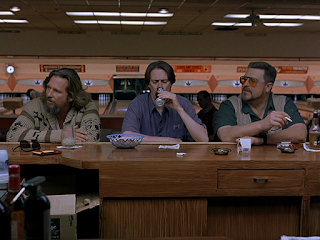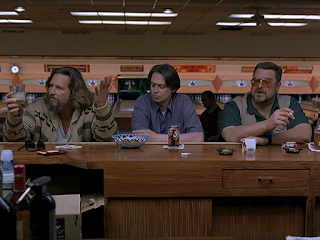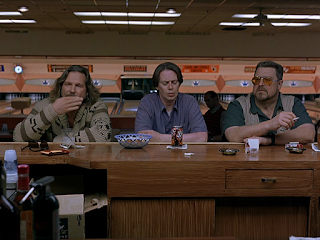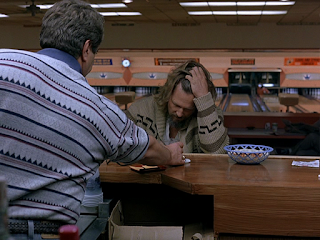However, there are occasions when a long, unbroken take makes for a compelling scene. Consider this scene from The Big Lebowski. By traditional standards of cinema, this should make for a dull sequence; our three main characters sit at a bar and talk. No cuts and no camera movement until the end.
But the Coen Brothers, who wrote and directed the film, have made their career out of breaking norms. There's a strategy at work that serves the story at this juncture.
Important things to note. This scene follows two developments. First, the Nihilists have demanded the ransom money from the Dude, and if he doesn't deliver, they will castrate him (they make this point after dropping a ferret in the bathtub with him.).
Second, the Dude's car, which contained the money, has been recovered at a police impound lot but with no sign of the money. When the Dude asks if the police have any leads, the officer on duty mocks him.
As this scene begins, the Dude is stuck. He's run out of options and has no idea what to do next. He explains (with the explanation beginning as voiceover in the previous scene):
"My only hope is the Big Lebowski kills me before the Germans can cut my dick off."
Walter: "Now that is just ridiculous, Dude. No one is going to cut your dick off."
Dude: "Thank you, Walter."
Walter: "Not if I have anything to say about it."
This is the setup the shot holds for a long time. A wide angle so we get all three characters - the Dude, Donny, and Walter - in the shot. They're featured prominently, which makes sense. They're in the middle ground of the shot. The foreground is filled with details of the bar, and the background, while a little blurry, shows the bowling lanes behind the characters as well as other bowlers in silhouette, so we keep our attention on the main three.
Why is this important? Because even though this is a static shot, it is still a dynamic shot, awash with details about the characters and the setting. On the bar, we can see props that highlight quirks of the character. The burnout hippy Dude has his sunglasses and a white Russian drink in front of him, the child-like Donny drinks orange soda while caught between his more dominant friends, and the militant, bombastic, stressed-out Vietnam vet Walter, still wearing his sunglasses indoors, drinks a beer and smokes. There's also a bowl of peanuts.
This angle not only lets us see all our characters at once - we don't have to cut away to show a reaction shot - but it also lets us see their faces clearly. The facial reactions of Dude, Donny, and Walter provide a lot of the humor. Because this is all one take, the performers can build comic momentum. Instead of cutting away to underline a joke, the Coens let the jokes spring naturally from the interaction and the little details.
Also, it's just funny how the Dude and Walter, who do an overwhelming amount of talking, keep Donny between them instead of sitting next to each other. Is he a buffer between their opposing viewpoints, or is he just so ignored, he might as well not be there? Either way, Donny is smack in the middle of the shot, despite not really contributing anything; we're forced to notice him and how the others literally and figuratively talk over him.
In the background, the bowling alley keeps moving. The Dude and company are in their own little world to some extent, but the world at-large does not stop for them. We see enough to give the shot depth but not so much activity and detail that they distract from the dialogue and main characters. The shot feels three dimensional.
Dude: "Thank you, Walter. That makes me feel very secure."
Walter: "Dude..."
Dude: "That makes me feel warm inside."
Walter: "Now, Dude."
Dude: "This whole fucking thing - I could just be sitting here with just pee stains on my rug."
Walter: "Yeah."
Dude: "But, no man. I gotta, you know..."
Walter: "Fucking Germans. Nothing changes. Fucking Nazis."
Donny: "They were Nazis, Dude?"
Walter: "Oh come on, Donny, they were threatening castration."
Donny: "Uh huh."
Walter: "Are we gonna split hairs here?"
Donny: "No..."
Walter: "Am I wrong?"
Donny: "Well, he..."
Walter: "Am I..."
Dude: "Man, they were nihilists, man. "
Walter: "Huh?"
Dude: "They kept saying they believe in nothing."
In the middle of this exchange, in the background, a bowler throws a gutter ball. Not an important detail, but I'll discuss it more below.
Walter: "Nihilists. Fuck me. I mean say what you want about the tenets of National Socialism, Dude, at least it's an ethos."
In the background, the still-standing pins from the gutter ball are knocked over by the machine for a reset. We distinctly hear them after Walter says "Nihilists." Walter is treating this revelation like a big eureka moment, which the knocked over pins would emphasize. Instead, it highlights Walter's misguided obsession over unimportant, often inaccurate details.
Walter: a guy who rolls a gutter ball and thinks he hit a strike.
Dude: "Yeah."
Walter is not done. While he continues talking, trying to look forceful and decisive, we can see Dude is getting frustrated and running out of patience.
Walter: "And let's also not forget -- let's not forget, Dude -- that keeping wildlife, uh, an amphibious rodent, for uh, you know, domestic, within the city -- that ain't legal either."
Dude: "What are you? A fucking park ranger now?"
Walter: "No, I'm just trying to uh..."
Dude: "Who gives a shit about the fucking marmot!"
Walter: "We're sympathizing here, Dude."
Dude: "Fuck sympathy! I don't need your fucking sympathy! I need my fucking johnson!"
To emphasize the point, Dude gestures toward his groin. Again because of the shot setup, we see this action along with everyone's reaction.
Donny asks an important question.
Donny: "What do you need that for, Dude?"
Walter reasserts his command, trying to talk about something more important than the threat on the Dude's life or johnson: bowling.
Dude: "Fuck the tournament. Fuck you, Walter!"
There is the briefest of pauses before Walter responds. In that flash, Walter's face fills with hurt, then anger. The Dude crossed a line.
Walter: "Fuck the tournament?"
Walter: "Ok, Dude. I can see you don't want to be cheered up here. Come on, Donny. Let's go get us a lane."
Finally, some camera movement. As Walter and Donny leave, the camera pans left until the Dude is in the center of the frame, and it slowly moves closer to him.
The camera keeps creeping in on the Dude. His sunglasses, upside down and facing away from him, metaphorically reflect how he doesn't see a way out of his situation. Plus, everyone - the Big Lebowski, the Nihilists, Jackie Treehorn and his thugs - is looking for Dude to deliver what he can't find: the money.
The Dude gets a new drink.
Now, the Dude is all alone in the frame. The background is empty and out of focus, and his two friends are gone. He is stuck, and we see it in Jeff Bridge's face.
Static can be dynamic as this scene demonstrates. The camera only moves a little bit, to further highlight the Dude's predicament and isolation, but the wealth of visual details keeps the scene from being flat.
The wide-angle, medium shot shows all three performers simultaneously and allows the audience to see a wide range of emotions: anger, sarcasm, hopelessness, fear, frustration, naiveté, misguided priorities, unfounded certainty. The humor stems from the interaction among Dude, Walter, and Donny, and this setup allows to see all of this and how they play off each other. Cutting back and forth, highlighting one detail at a time, wouldn't have been as an engaging.
Plus, we can see the bar in the foreground and the bowling alley in the background. This feels like a real place these three are part of.
In the background, the bowling alley keeps moving. The Dude and company are in their own little world to some extent, but the world at-large does not stop for them. We see enough to give the shot depth but not so much activity and detail that they distract from the dialogue and main characters. The shot feels three dimensional.
Dude: "Thank you, Walter. That makes me feel very secure."
Walter: "Dude..."
Dude: "That makes me feel warm inside."
Walter: "Now, Dude."
Dude: "This whole fucking thing - I could just be sitting here with just pee stains on my rug."
Walter: "Yeah."
Dude: "But, no man. I gotta, you know..."
Walter: "Fucking Germans. Nothing changes. Fucking Nazis."
Donny: "They were Nazis, Dude?"
Walter: "Oh come on, Donny, they were threatening castration."
Donny: "Uh huh."
Walter: "Are we gonna split hairs here?"
Donny: "No..."
Walter: "Am I wrong?"
Donny: "Well, he..."
Walter: "Am I..."
Dude: "Man, they were nihilists, man. "
Walter: "Huh?"
Dude: "They kept saying they believe in nothing."
In the middle of this exchange, in the background, a bowler throws a gutter ball. Not an important detail, but I'll discuss it more below.
Walter: "Nihilists. Fuck me. I mean say what you want about the tenets of National Socialism, Dude, at least it's an ethos."
In the background, the still-standing pins from the gutter ball are knocked over by the machine for a reset. We distinctly hear them after Walter says "Nihilists." Walter is treating this revelation like a big eureka moment, which the knocked over pins would emphasize. Instead, it highlights Walter's misguided obsession over unimportant, often inaccurate details.
Walter: a guy who rolls a gutter ball and thinks he hit a strike.
Dude: "Yeah."
Walter is not done. While he continues talking, trying to look forceful and decisive, we can see Dude is getting frustrated and running out of patience.
Walter: "And let's also not forget -- let's not forget, Dude -- that keeping wildlife, uh, an amphibious rodent, for uh, you know, domestic, within the city -- that ain't legal either."
Dude: "What are you? A fucking park ranger now?"
Walter: "No, I'm just trying to uh..."
Dude: "Who gives a shit about the fucking marmot!"
Walter: "We're sympathizing here, Dude."
Dude: "Fuck sympathy! I don't need your fucking sympathy! I need my fucking johnson!"
To emphasize the point, Dude gestures toward his groin. Again because of the shot setup, we see this action along with everyone's reaction.
Donny asks an important question.
Donny: "What do you need that for, Dude?"
Walter reasserts his command, trying to talk about something more important than the threat on the Dude's life or johnson: bowling.
Walter: "You gotta buck up, man. You cannot drag this negative energy into the tournament."
Dude has had enough.Dude: "Fuck the tournament. Fuck you, Walter!"
There is the briefest of pauses before Walter responds. In that flash, Walter's face fills with hurt, then anger. The Dude crossed a line.
Walter: "Fuck the tournament?"
Walter: "Ok, Dude. I can see you don't want to be cheered up here. Come on, Donny. Let's go get us a lane."
Finally, some camera movement. As Walter and Donny leave, the camera pans left until the Dude is in the center of the frame, and it slowly moves closer to him.
The Dude orders another drink.
Dude: "Another Caucasian, Gary."
Gary: "Right, Dude."
Dude: "Friends like these, huh, Gary."
Gary: "That's right, Dude."
We see a brief glimpse of Gary the bartender but not his face. He replaces Dude's drink and goes back to work. He might know the Dude, but he's not going to stop and listen to his problems.
The Dude tries flicking a peanut into the bowl and misses. Nothing goes his way.The camera keeps creeping in on the Dude. His sunglasses, upside down and facing away from him, metaphorically reflect how he doesn't see a way out of his situation. Plus, everyone - the Big Lebowski, the Nihilists, Jackie Treehorn and his thugs - is looking for Dude to deliver what he can't find: the money.
The Dude gets a new drink.
Now, the Dude is all alone in the frame. The background is empty and out of focus, and his two friends are gone. He is stuck, and we see it in Jeff Bridge's face.
Static can be dynamic as this scene demonstrates. The camera only moves a little bit, to further highlight the Dude's predicament and isolation, but the wealth of visual details keeps the scene from being flat.
The wide-angle, medium shot shows all three performers simultaneously and allows the audience to see a wide range of emotions: anger, sarcasm, hopelessness, fear, frustration, naiveté, misguided priorities, unfounded certainty. The humor stems from the interaction among Dude, Walter, and Donny, and this setup allows to see all of this and how they play off each other. Cutting back and forth, highlighting one detail at a time, wouldn't have been as an engaging.
Plus, we can see the bar in the foreground and the bowling alley in the background. This feels like a real place these three are part of.


























No comments:
Post a Comment